How to Use Medication Management to Enhance Addiction Treatment

The Critical Role of Medication Management in Addiction Recovery
Medication management is a cornerstone of effective addiction treatment, ensuring that pharmacological interventions are safe, effective, and tailored to individual needs. When integrated with behavioral therapies and comprehensive care, medication oversight enhances treatment outcomes, reduces relapse risks, and supports long-term sobriety. This article explores how medication management functions within addiction treatment and outlines best practices to leverage its full potential.
Understanding How Medication Management Works in Addiction Treatment
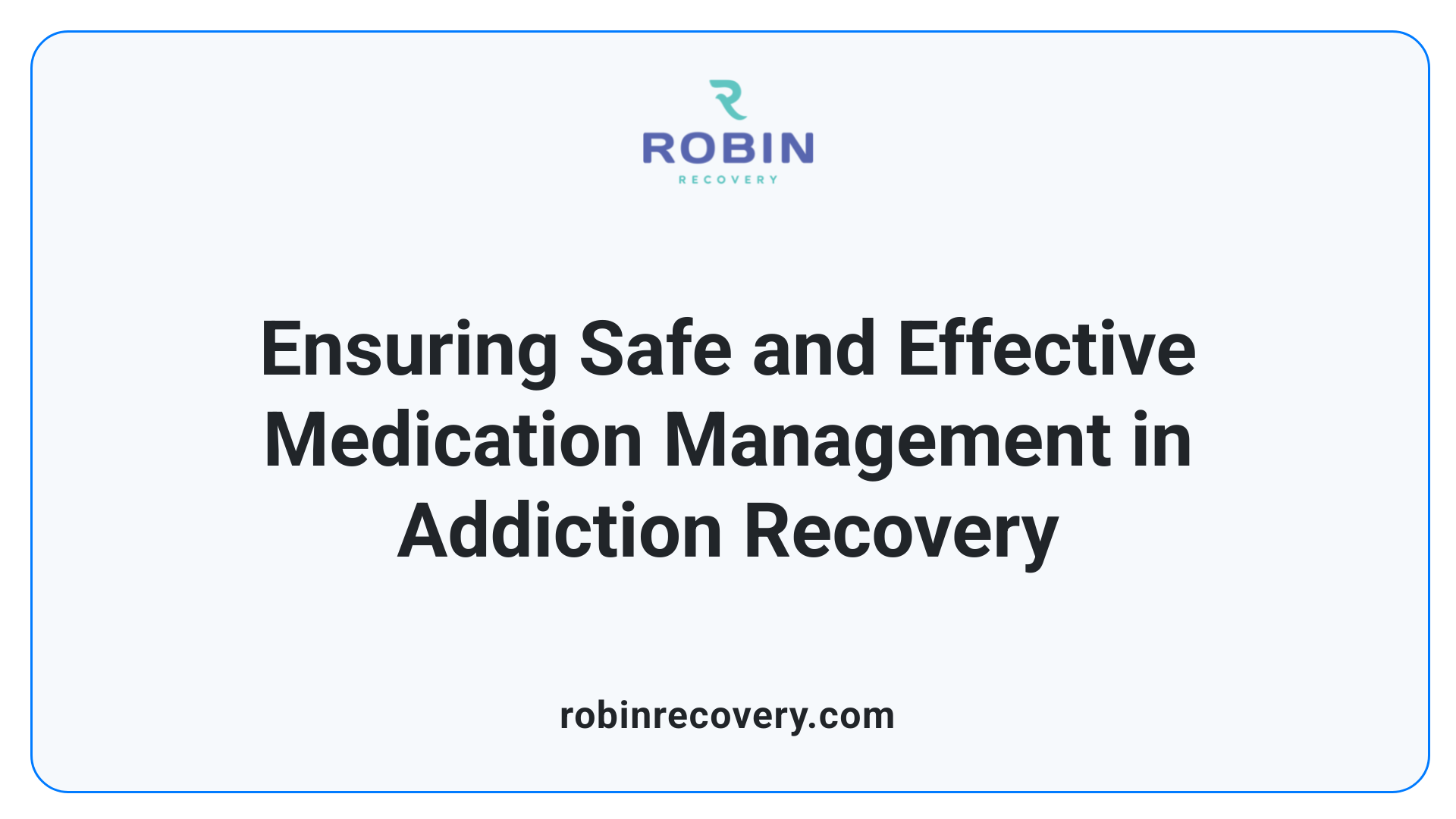
How does medication management work in addiction treatment?
Medication management plays a vital role in the overall approach to treating substance use disorders. It involves the careful prescribing, oversight, and adjustment of medications to ensure safety and maximize their effectiveness. Healthcare professionals coordinate these efforts through processes such as medication reconciliation—reviewing all medicines a patient is taking during each care transition to prevent potential interactions or errors.
The review process also includes monitoring for side effects, adjusting doses, and replacing or eliminating drugs that no longer serve the treatment plan. Patient education is integral, empowering individuals to understand their medications, adhere to prescribed regimens, and recognize adverse effects.
To support this, systems and protocols—often guided by organizations like the Agency for Healthcare Research and Quality (AHRQ)—are put in place to foster safe medication practices. These initiatives emphasize communication among providers, continuous patient engagement, and systematic safety protocols. The goal is to improve treatment outcomes by reducing the likelihood of medication errors, preventing overdose, and supporting sustained recovery.
In essence, medication management in addiction treatment ensures that medication use is precise, monitored, and adapted to individual needs, fostering safer, more effective recovery pathways.
Medications Used in Medication-Assisted Treatment (MAT) for Addiction
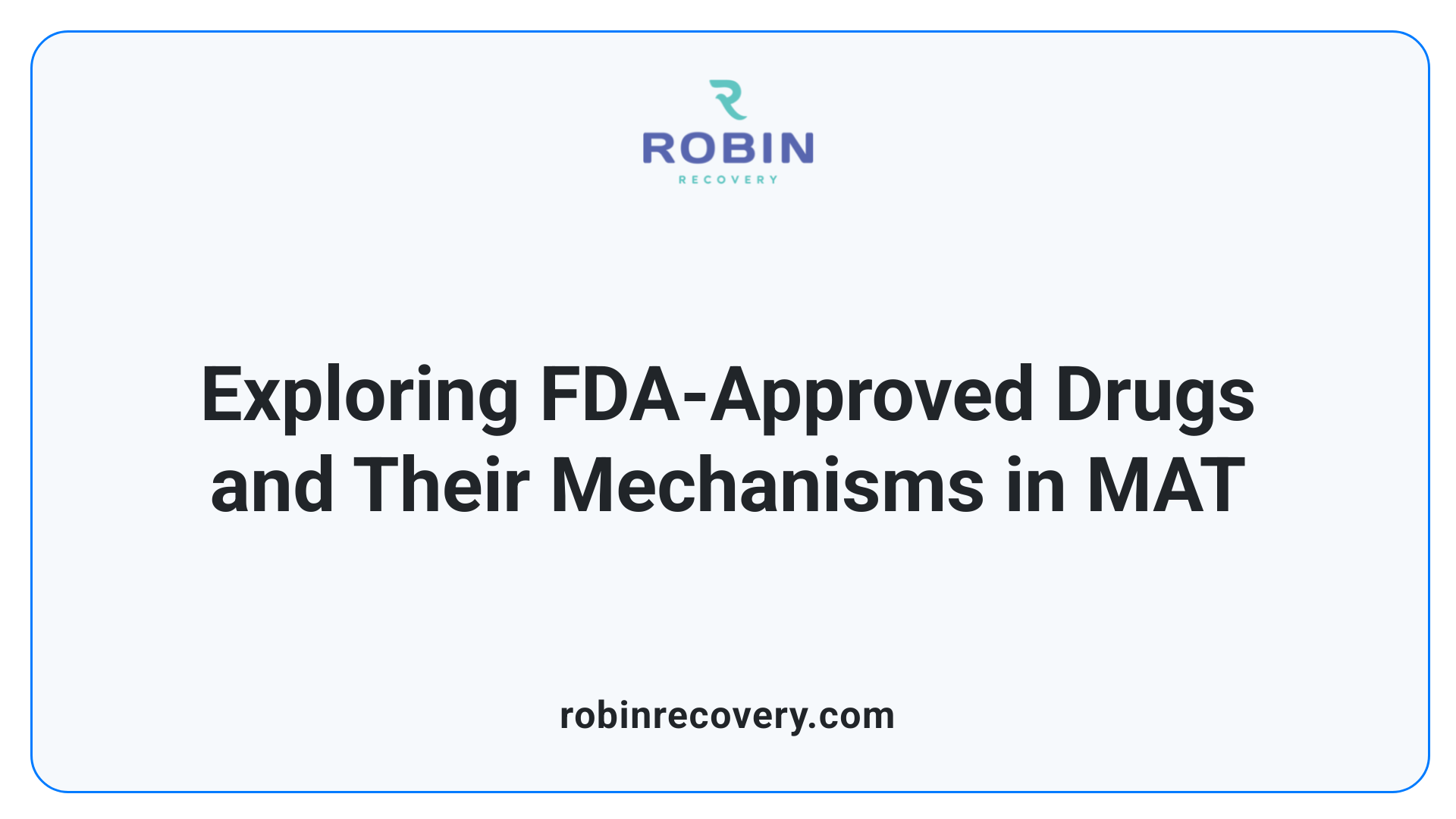
What medications are used in medication-assisted treatment (MAT) for addiction?
Medication-assisted treatment (MAT) involves the use of FDA-approved drugs combined with behavioral therapies to treat substance use disorders effectively. For alcohol use disorder, medications such as acamprosate, disulfiram, and naltrexone are commonly prescribed. These drugs aim to reduce cravings, manage withdrawal symptoms, and prevent relapse, although they are not cures. Acamprosate modulates glutamate receptors to decrease cravings, disulfiram creates an adverse reaction with alcohol to deter drinking, and naltrexone blocks the rewards associated with alcohol consumption.
For opioid use disorder, medications like buprenorphine, methadone, and naltrexone are utilized to normalize brain chemistry, lessen cravings, and block euphoric effects. Buprenorphine acts as a partial opioid agonist, easing withdrawal symptoms and reducing the risk of overdose; it can be prescribed in physicians’ offices, increasing treatment accessibility. Methadone is a long-acting full opioid agonist, usually dispensed through specialized clinics, and helps manage severe dependence. Naltrexone, an opioid antagonist, prevents the euphoric effects of opioids and supports abstinence, available in oral and extended-release injectable forms for long-term use.
What are the mechanisms of action of these medications?
These medications work through different pathways involving brain receptors and neurotransmitter systems. Buprenorphine partially stimulates opioid receptors, providing enough activation to prevent withdrawal but not enough to produce euphoria. Methadone fully stimulates these receptors but in a controlled manner, decreasing cravings and withdrawal without euphoria when used properly. Naltrexone blocks opioid receptors completely, preventing any euphoric effects if opioids are used.
Acamprosate interacts with glutamate and gamma-aminobutyric acid (GABA) receptors to help balance brain chemistry affected by alcohol dependence, making cravings less intense. Disulfiram inhibits the enzyme aldehyde dehydrogenase, leading to unpleasant effects if alcohol is consumed, thus acting as a deterrent.
How are these medications prescribed and dispensed?
Medications like buprenorphine can be prescribed by specially trained physicians in office-based settings, making access easier for many patients. Methadone, on the other hand, is typically dispensed through certified opioid treatment programs due to regulatory requirements. Naltrexone tablets are prescribed for oral use, while the extended-release form requires administration via injection at healthcare facilities.
Proper management includes regular monitoring to ensure effectiveness, prevent misuse, and adjust doses as needed. Providers also educate patients on safe storage and disposal to prevent accidental ingestion, especially in households with children.
Are there innovations, such as long-acting formulations?
Yes, recent innovations include long-acting injectable naltrexone, which provides sustained medication effects for about a month. This formulation improves adherence by reducing the need for daily dosing. Researchers are also exploring implantable buprenorphine devices and other sustained-release formulations for better treatment compliance.
These advancements aim to make medication management more convenient, increase treatment retention, and improve overall outcomes for individuals battling addiction.
Integrating Medication Management with Behavioral Therapies for Better Outcomes
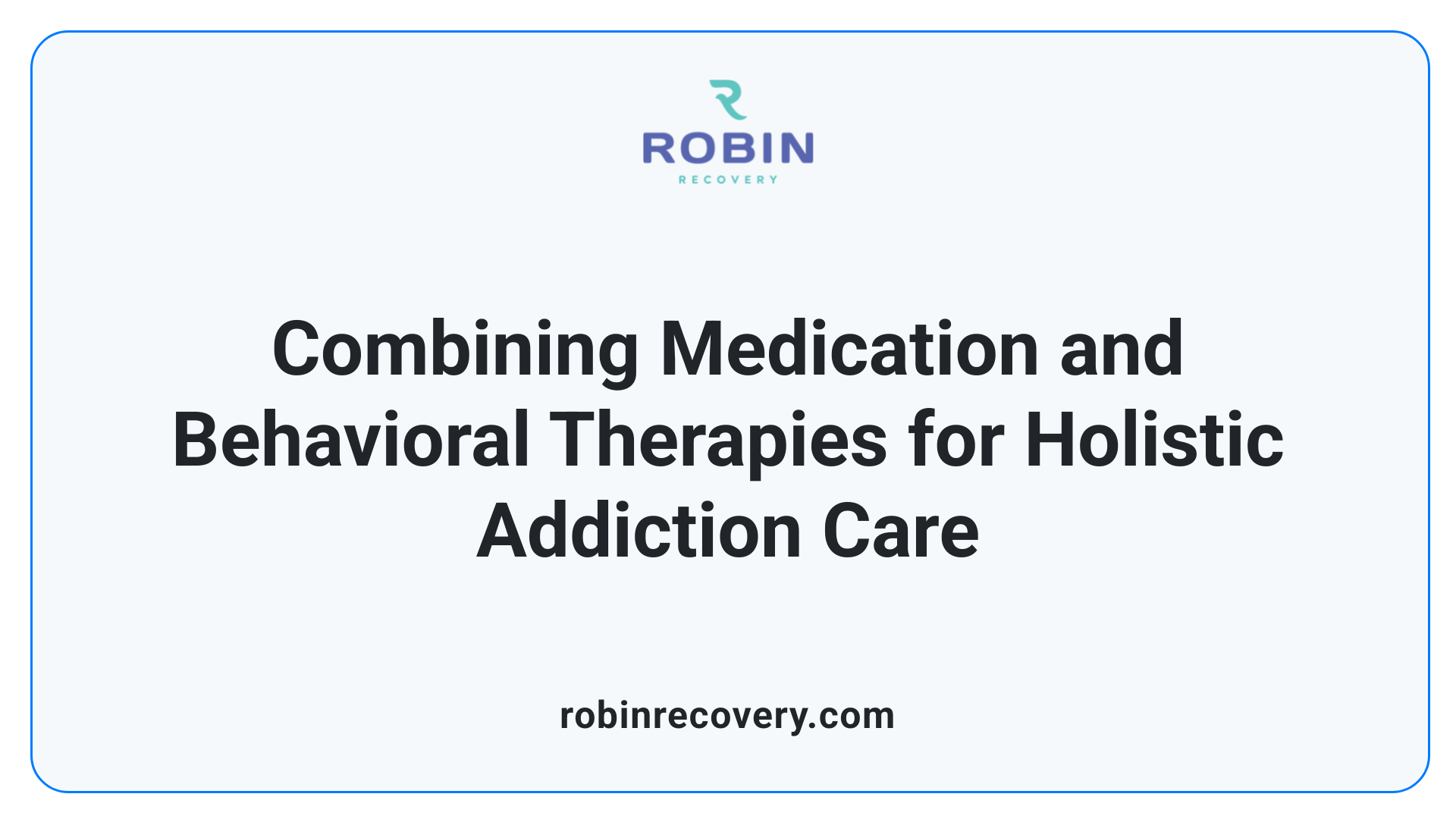
How does medication management fit into the overall treatment process for substance use disorder?
Medication management plays a crucial role in the broader treatment landscape for substance use disorder (SUD). It primarily helps address the physical aspects of addiction by alleviating withdrawal symptoms, reducing intense cravings, and preventing overdose, especially in cases involving opioids and alcohol. When used alongside behavioral therapies and counseling, medication management becomes part of a comprehensive, patient-centered approach that treats both the physical and psychological facets of addiction.
Effective medication management involves personalized dosing, careful monitoring, and periodic adjustments by healthcare providers to ensure safety and efficacy. Medications such as buprenorphine, methadone, naltrexone, acamprosate, and disulfiram have demonstrated success in improving treatment outcomes, supporting long-term recovery, and reducing relapse risks.
This integrated approach helps stabilize the brain and body chemistry, thereby making it easier for individuals to engage actively in therapeutic interventions. Behavioral therapies like cognitive-behavioral therapy (CBT), contingency management, and family therapy are used to address underlying issues, develop coping skills, and prevent relapse.
Overall, combining medication management with psychotherapy and ongoing support creates a holistic treatment plan. It aims to optimize recovery, enhance mental and physical health, and support individuals in reclaiming their independence, leading to sustained sobriety and improved quality of life.
For more detailed insights, searching for "integrating medication management with therapy in addiction" provides extensive resources on this topic.
Guiding Principles for Effective Medication Management in Addiction Care
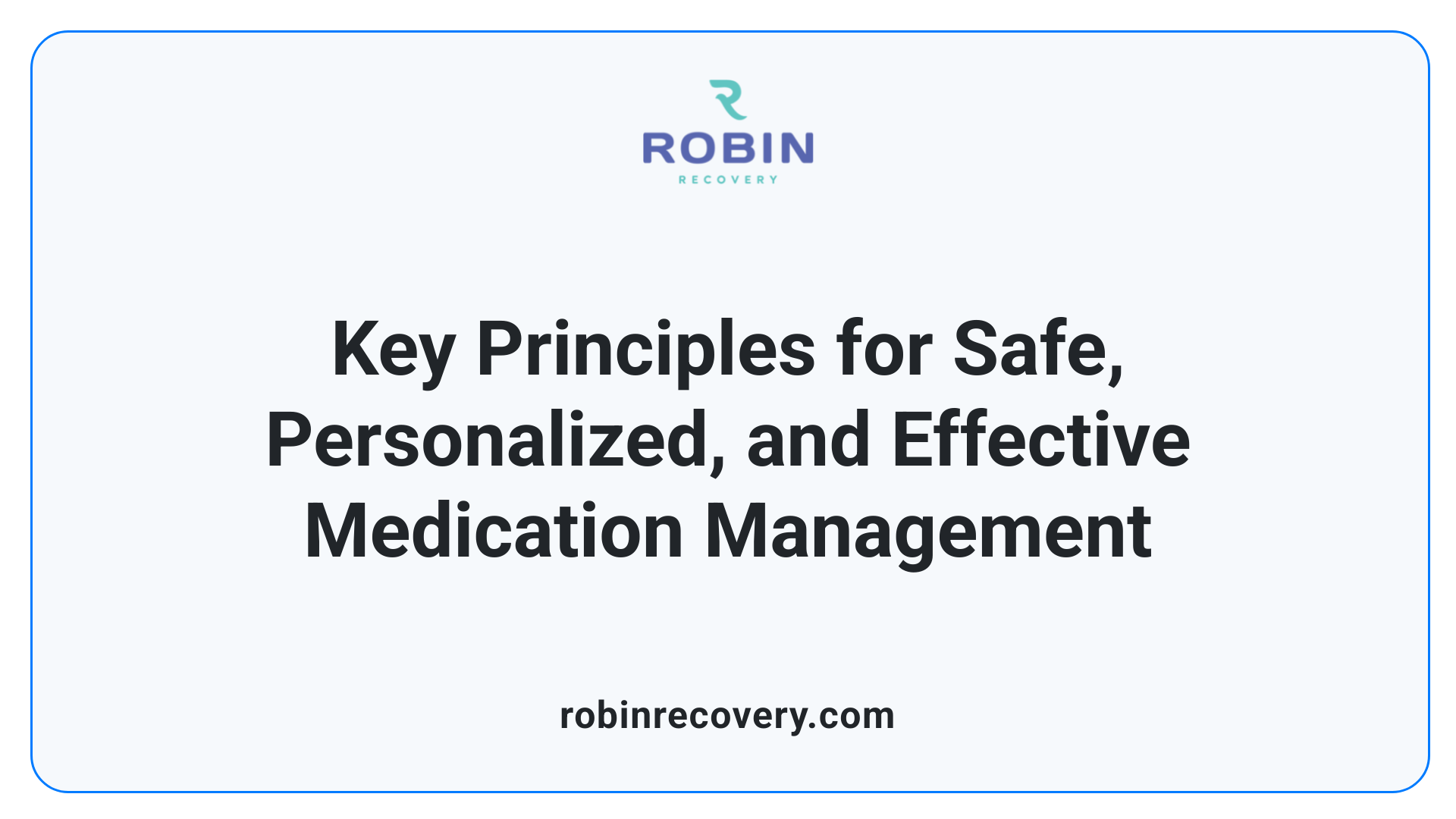
What are the principles guiding effective medication management in addiction care?
Effective medication management in addiction care hinges on several core principles aimed at optimizing recovery outcomes. The first is individualized treatment planning, where therapy is tailored to each person's unique medical history, mental health status, and social circumstances. Customized plans ensure that medications and support services align with the specific needs of the individual.
Continual assessment and adjustment are also vital. Treatment progress, side effects, and any co-occurring mental health conditions are regularly monitored to refine medication dosages and modify treatment strategies accordingly. This dynamic approach helps in addressing evolving needs and reduces risks of adverse effects.
Patient safety and engagement are foundational to effective management. Medications should be prescribed, stored properly, and administered with strict adherence to safety protocols. Engaging patients through education about their medications, involving them in decision-making, and empowering them to participate actively in their treatment fosters better adherence and motivation.
A comprehensive care approach is essential, combining medication with behavioral therapies such as cognitive-behavioral therapy, family therapy, and peer support. This integrated model enhances treatment efficacy by addressing both the biological and psychological aspects of addiction.
Finally, addressing co-morbid mental health issues is crucial. Many individuals with substance use disorders also suffer from mental health conditions that require concurrent management. Coordinated care that encompasses mental health treatment and substance use recovery promotes holistic well-being.
By adhering to these principles, healthcare providers can ensure safe, effective, and personalized medication management—supporting individuals in their journey toward sustained recovery and long-term wellness.
Challenges and Solutions in Implementing Medication Management for Addiction Treatment
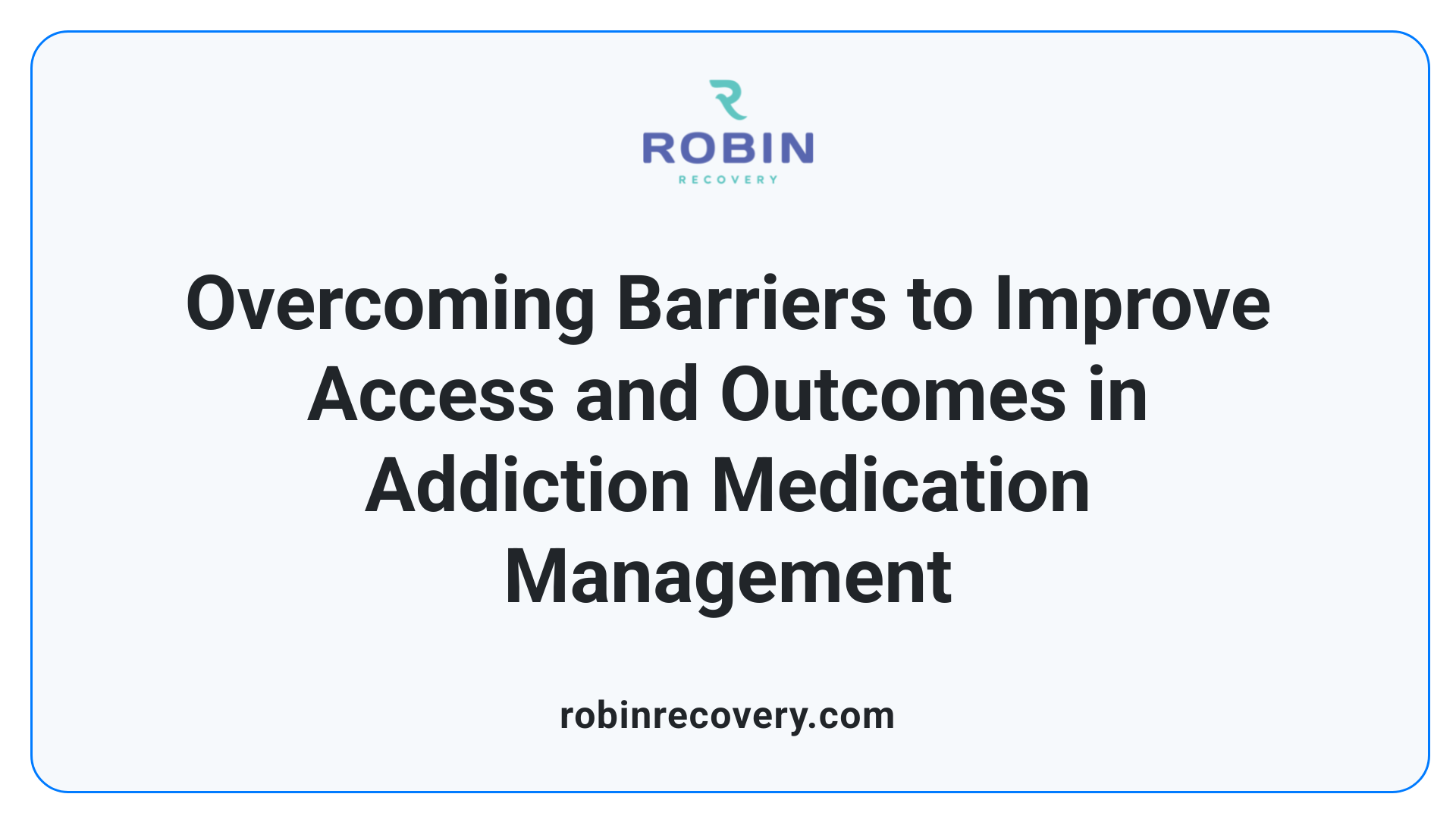
What are some common challenges in implementing medication management for addiction, and how can they be addressed?
Implementing medication management as part of addiction treatment faces several hurdles. Among the most prevalent issues are financial barriers. Many individuals lack insurance coverage or face high out-of-pocket costs, which can limit access to essential medications like methadone, buprenorphine, or naltrexone. To overcome this, programs can offer sliding scale fees, connect patients with Medicaid options, or provide scholarships to reduce financial burdens.
Geographic and transportation challenges are particularly significant in rural or underserved areas. Limited healthcare facilities and poor transportation options can prevent patients from consistently accessing treatment or medication pickups. Telehealth services have emerged as a valuable solution, enabling patients to consult with healthcare providers remotely and receive prescriptions and guidance without traveling long distances.
Stigma surrounding addiction remains a major obstacle. Misunderstanding and social judgment discourage many from seeking treatment, or they may be hesitant to adhere to medication regimens. Community education campaigns and public awareness programs can help change perceptions, promote understanding, and reduce shame associated with addiction.
For individuals with co-occurring mental health disorders, integrated treatment approaches that combine mental health and addiction services are crucial. Lack of provider training in medication management for addiction can lead to improper prescribing, monitoring, and side effect management. Ensuring that healthcare professionals receive specialized education and ongoing training enhances their capacity to deliver safe, effective, and comprehensive care.
How can these challenges be addressed to improve medication management in addiction treatment?
Addressing these barriers requires a multifaceted approach. Expanding access through telehealth can mitigate geographical and transportation issues. Policy reforms aimed at increasing insurance coverage, lowering costs, and supporting medication subsidies are essential. Public education initiatives play a vital role in destigmatizing addiction, encouraging individuals to seek help and adhere to treatment plans.
Simultaneously, integrating mental health services and offering provider training in addiction medicine can elevate the quality of care. Investment in systems that facilitate coordinated, patient-centered treatment ensures that individuals receive holistic support throughout their recovery journey.
These strategies collectively contribute to overcoming barriers, promoting safer and more effective medication management, and ultimately enhancing recovery outcomes.
Innovations in Medication Management and Future Directions
How do technological advancements like EHRs and telehealth improve medication management?
Electronic Health Records (EHRs) and telehealth have revolutionized how medication management is conducted in addiction treatment. EHR systems allow healthcare providers to access comprehensive, real-time medication histories, helping to prevent dangerous drug interactions and ensure accurate prescribing. These digital records facilitate better collaboration among doctors, pharmacists, and counselors, streamlining the entire treatment process.
Telehealth expands access to addiction care, especially in remote or underserved areas. Virtual check-ins enable ongoing monitoring of medication adherence, management of side effects, and adjustments to treatment plans without the need for in-person visits. Features like automated alerts, reminders, and decision support tools embedded within these digital systems contribute to safer, more effective medication management.
What are the promising areas of future medications and research?
Research continues to seek new medications and treatment strategies that improve outcomes across various substance use disorders. Emerging options include immunizations like TA-CD, which aims to prevent cocaine dependence, and novel dopamine agonists targeting stimulant dependencies. Advances in pharmacology focus on developing medications that are more effective, have fewer side effects, and increase adherence.
Despite these efforts, developing new pharmacotherapies remains challenging, due to the complex nature of addiction and brain chemistry. Ongoing studies aim to identify medications that better target the neural pathways involved in addiction, offering hope for more personalized and effective treatment options.
What safety protocols are being implemented to enhance medication use?
Safety is paramount in medication management. Current protocols emphasize proper storage—keeping medications out of reach of children and in a cool, dry place—and proper disposal of expired or unused drugs through pharmacy take-back programs. Education on medication use, potential side effects, and drug interactions is standard practice.
Future efforts focus on integrating strict monitoring procedures, including regular follow-ups, dose adjustments, and patient education. Healthcare providers promote the use of single pharmacies for tracking prescriptions and advise patients to carry updated medication lists. These safety measures aim to minimize risks, prevent overdose, and support long-term recovery.
Aspect Current Practice Future Directions Purpose Technology EHRs, telehealth Advanced AI-powered alerts, remote monitoring Enhance safety and access Medications FDA-approved, tailored to needs New drugs, vaccines, personalized medicine Improve effectiveness Safety Storage, disposal, caregiver education Enhanced tracking, stricter protocols Minimize risks
By leveraging technology, investing in research, and strengthening safety protocols, future medication management in addiction treatment is poised to become more effective, safer, and accessible for everyone seeking recovery.
Supporting Long-Term Recovery through Managed Care
In conclusion, medication management is a vital, dynamic component of comprehensive addiction treatment. By aligning pharmacological interventions with behavioral therapies, utilizing evidence-based principles, and overcoming systemic challenges, healthcare providers can significantly improve patient outcomes. Adapting to emerging technologies and research will further enhance the effectiveness and safety of medication strategies. Ultimately, continuous, personalized medication management supports individuals on their journey to sustained recovery, health, and well-being.
References
- National Helpline for Mental Health, Drug, Alcohol Issues
- Medications for Substance Use Disorders
- The Science of Addiction Treatment and Recovery
- 4 Benefits of Medication Management
- Substance Use Disorder (SUD): Symptoms & Treatment
- Medication Assisted Treatment (MAT)
- The Benefits of Medication Management for Patients
